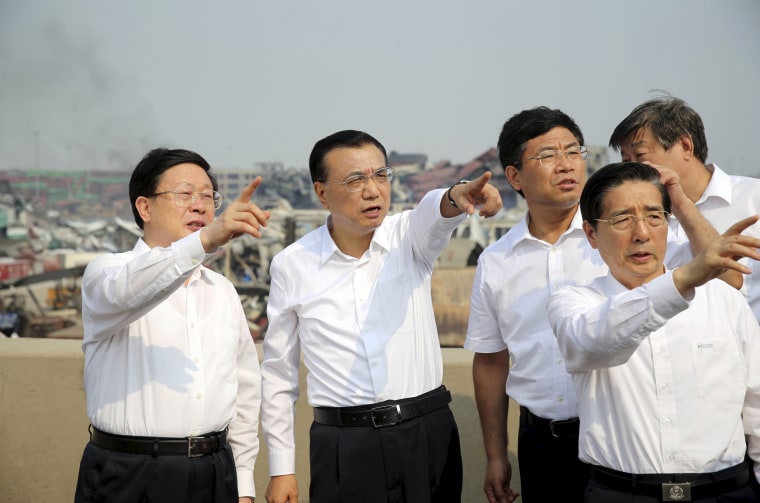BEIJING — Chinese officials are trying to show they're all over the deadly blasts in the port city of Tianjin while simultaneously scrambling to distance themselves from the politically dicey disaster.
State media Monday carried large photographs of Premier Li Keqiang with local officials in identical whites shirt and trousers visiting the scene of massive toxic Tianjin explosions.
Li has promised a thorough investigation and punishment for those responsible — even while the authorities were busy closing down dozens of "rumor-mongering" websites for demanding pretty much the same thing.

"Officials must carry out their duties 'with a strong sense of responsibility toward the general public and people's lives,'" the People's Daily, Communist Party flagship paper, quoted Li as saying on Sunday. "Readings of air water and soil quality must be taken accurately and publicized and in an open and timely manner, without withholding information."
The message to the public clearly is: We're on top on this and going to sort this out. The truth is that the huge blasts that killed 114 and sent a toxic cloud into the air over the world's 10th-largest port have badly rattled Beijing officials.
It took Li almost four days to visit the scene of the blasts. With the June Yangtze River cruise ship disaster, he rushed to the scene seemingly immediately. That disaster, though, was more politically manageable — it could plausibly be blamed on bad weather and an apparently negligent skipper who continued sailing regardless.
Tianjin is tricky for the Communist Party because, according to numerous local reports, there appear to have been big regulatory and legal failures — from the type and quantity of highly toxic chemicals stored at the site to the apparent lack of an inventory and the location of such a dangerous stockpile so close to residential areas.
Related: Toyota Halts Tianjin Operations After Explosions
While the name of the company that owned the warehouse complex has been made public — Ruihai International Logistics, a four-year-old firm that employed about 70 workers — the company's website has been taken down, as has the corporate registry database of the city of Tianjin. That has fueled online speculation that local officials were involved with the company. No evidence to that effect has been presented, but such involvement would not be unusual in China.
Then there is the loss of life. The death toll includes 39 firefighters, who also make up the majority of those still missing. In China, firefighters are usually recruited from army conscripts.
They are young and not always experienced — especially when dealing with complicated chemical fires and responding to an emergency with limited information — as they appeared to be on Wednesday.
One theory, floated by officials during a press conference, is that while fighting an initial blaze they used water on volatile chemicals, sparking the massive explosions. Relatives of firefighters have been at the forefront of recent protests, disrupting government press conferences and demanding information on their missing loved ones and on the chemicals they were dealing with.
Local officials' handling of the aftermath of the explosions has also been confusing, ordering an evacuation of everybody within 1.8 miles of the blast area over the weekend only later to deny that such an order had been given.
So far, Chinese media has been feisty in its coverage of the blasts.
Coverage of an explosion decimating a large part of a big city is far harder for the government to manage than the ferry disaster — even for the Communist Party — and many Chinese journalists do not toe the party line. Especially after a disaster like this one.
Related: 'Like a Nuclear Bomb,' Says Man Behind Stunning Video
A China Daily editorial on Monday declared that a lack of verified information would feed conspiracy theories.
"These conspiracy theories will build a head of steam unless the government unravels the mysteries surrounding the incident with a thorough and transparent probe that is able to answer people's questions," it said.
The problem, though, is that transparency is not in Communist Party's DNA. Skeptics will also point to the aftermath of the 2008 Sichuan earthquake, in which thousands of children died because of shoddy construction of schools.
Initially distraught protesting parents where promised an investigation and justice, only later to be threatened into silence, their supporters persecuted.
